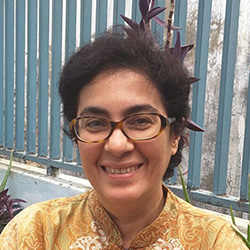
While the benefits and pitfalls of cultivating palm oil are often debated on the global stage, regional- and local-level insight is frequently missing from such conversations.
Such insight was front and center, however, of a ‘talk show’ held in Jakarta on 11 January 2024, in which regional leaders from Indonesia’s main palm oil-producing areas discussed the contributions of the palm oil industry to regional incomes and welfare, as well as the accompanying challenges within the sector.
The event was held as part of a Centre for International Forestry Research and World Agroforestry (CIFOR-ICRAF) study to improve the readiness of the districts to implement jurisdictional programs (JP) through participatory, multi-stakeholder, and gender-inclusive approaches.
The leaders – who variously represented three districts in Kalimantan and one district in Sumatra – underscored the importance of sustainable practices, local community benefits, and the industry’s potential for growth. Their discussion highlighted the diverse approaches and challenges each district faces in maximizing the benefits of the palm oil industry while ensuring environmental sustainability.
Kartiyus, the regional secretary of Sintang District in West Kalimantan, highlighted the significant contribution of palm oil to the district’s economy: it accounts for 23.3 percent of gross regional income and is largely responsible for the current annual growth of 4-5 percent in regional GDP. He said that there are 40 palm oil producing companies operating in the district, which manage a combined area of 201,000 hectares, and that these companies have addressed regional isolation issues by taking on the task of infrastructure development.
Edy Purwanto Casmani, a representative of Pulang Pisau District in Central Kalimantan, emphasized the importance of palm oil for the local smallholder community. With active plantation areas of around 8,470 hectares and nine palm oil companies, the district has seen a rise in local employment and economic benefits; Casmani noted that palm oil is a popular choice among locals due to its profitable returns.
In Sumatra, Zulkifli – the regent assistant on government and community welfare for Pelalawan District – said that the palm oil industry has made the district the second most prosperous in Riau Province with the lowest inflation rate. Even the COVID-19 pandemic did not seriously impact the district’s economic wellbeing, he said.
Potential for further benefits through a jurisdictional approach
Herry Purnomo, who directs the Indonesia Country Programme at CIFOR-ICRAF, explained during the event that the overarching study seeks to “build a knowledge base for jurisdictional program (JP) design that is locally responsive and enables JP implementation at scale, and co-design a Theory of Change, Theory of Action, and Monitoring Evaluation Framework (TTM) to support JP implementation at both district and national levels.”
The talkshow itself formed part of the third workshop to disseminate the progress and results of the research so far, share experiences of developing JP initiatives, and solicit inputs for the draft TTM, he said. “At the national level, we have made progress by co-designing the TTM based on lessons learned in the four research districts and creating the Simulation of Indonesia Palm Oil Sustainability (SIPOS) model,” he said.
Planning for sustainability
On the subject of sustainability, Kartiyus noted that Sintang has had a sustainable palm oil regional action plan in place since 2018 and that this will be updated in 2024. In accordance with that, all palm oil plantations in Sintang are in non-forested areas and are legally allocated for commercial and residential use. All plantation permit holders must also set aside at least 7 percent of the area they manage for conservation.
He said that all 40 companies operating in the region – both private and community plantations – are Indonesia Sustainable Palm Oil (ISPO) certified and must show strict compliance with sustainability standards. He also mentioned that 71 companies formerly operating in the district had had their permits revoked for failing to meet these requirements, and that despite this upheaval the district had succeeded in maintaining low unemployment rates.
In line with his Kalimantan counterparts, Zulkifli highlighted his district’s commitment to sustainable palm oil, which includes the establishment of Indonesia’s only higher educational institution dedicated to palm oil science. He said environmental issues had become increasingly central to the district’s decisionmaking – especially as such issues pertain to preventing forest fires. He detailed efforts such as purchasing excavators for safe land clearing and forming village-based task forces to protect peatlands from fire.
Following consensus on the need for sustainable palm oil production that balances environmental protection, economic growth, and social welfare, the leaders agreed that ongoing commitment to overcoming challenges, particularly related to land tenure, remained critical. Casmani shared his hopes that the central government will help to address the problem of land legality in his region. “It is better [for the government] to support the facilitation of community plantations, and flexible allocation of palm oil revenue-sharing funds to develop the district,” he said.
Acknowledgements
This article and event are part of CIFOR-ICRAF research on scaling jurisdictional approaches in the Indonesian palm oil sector. The research is funded by the Walmart Foundation. Its findings, conclusions, and recommendations do not necessarily reflect the opinions of the Walmart Foundation.
We want you to share Forests News content, which is licensed under Creative Commons Attribution-NonCommercial-ShareAlike 4.0 International (CC BY-NC-SA 4.0). This means you are free to redistribute our material for non-commercial purposes. All we ask is that you give Forests News appropriate credit and link to the original Forests News content, indicate if changes were made, and distribute your contributions under the same Creative Commons license. You must notify Forests News if you repost, reprint or reuse our materials by contacting forestsnews@cifor-icraf.org.












